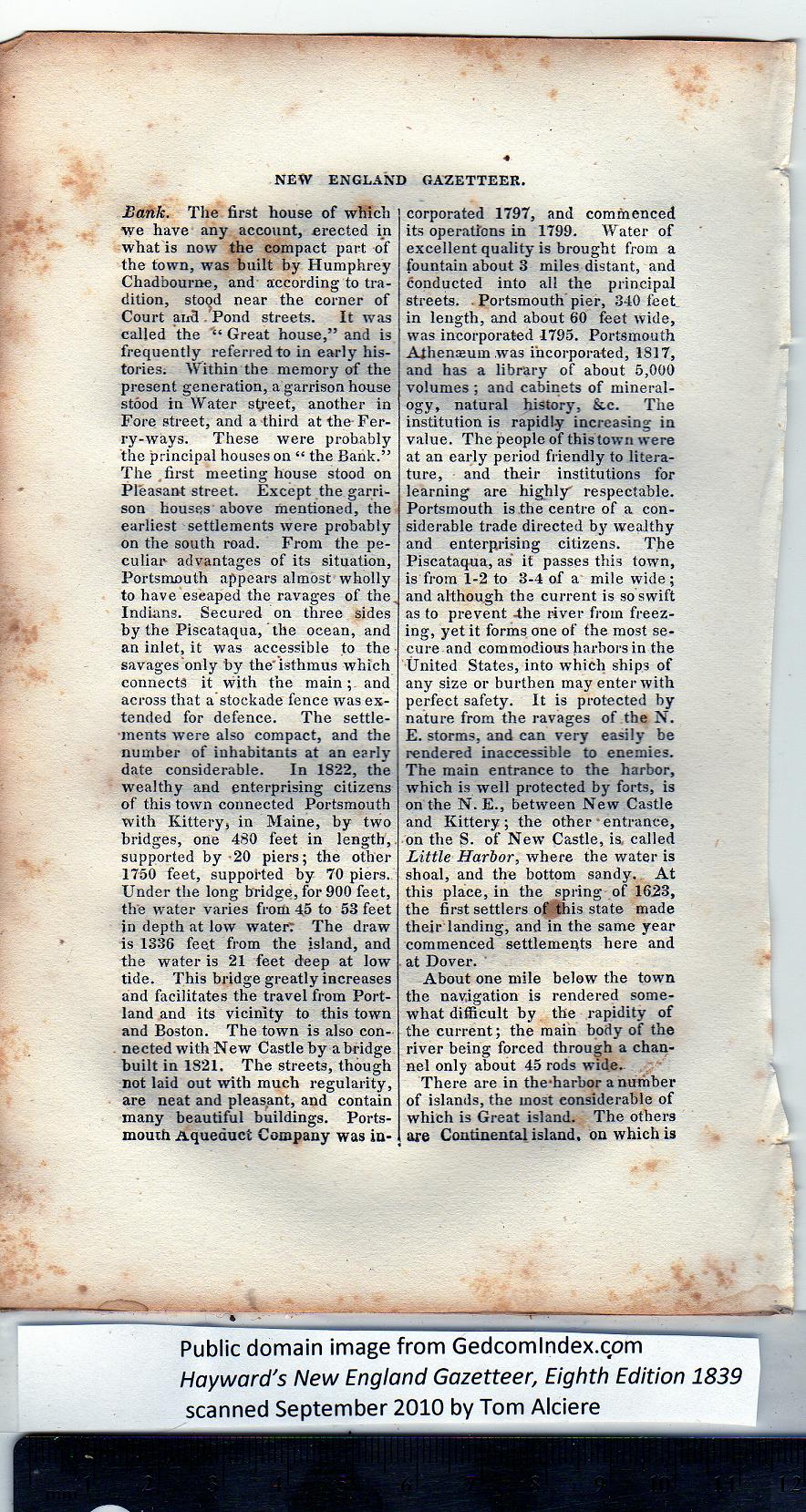|
Bank. The first house of which
we have any account, erected in
what is now the compact part of
the town, was built by Humphrey
Chadbourne, and according to tra-
dition, stood near the corner of
Court and Pond streets. It was
called the “ Great house,” and is
frequently referred to in early his-
tories. Within the memory of the
present generation, a garrison house
stood in Water street, another in
Fore street, and a third atthe-Fer-
ry-ways. These were probably
the principal houses on “ the Bank.”
The , first meeting house stood on
Pleasant street. Except the garri-
son houses above mentioned, the
earliest settlements were probably
on the south road. From the pe-
culiar advantages of its situation,
Portsmouth appears almost wholly
to have escaped the ravages of the.
Indians. Secured on three sides
by the Piscataqua, the ocean, and
an inlet, it was accessible to the
savages only by the'isthmus which
connects it with the main; and
across that a stockade fence was ex-
tended for defence. The settle-
ments were also compact, and the
number of inhabitants at an early
date considerable. In 1822, the
wealthy and enterprising citizens
of this town connected Portsmouth
with Kittery, in Maine, by two
bridges, one 480 feet in length,,
supported by 20 piers; the other
1750 feet, supported by 70 piers.
Under the long bridge, for 900 feet,
the water varies from 45 to 53 feet
in depth at low water: The draw
is 1336 feet from the island, and
the water is 21 feet deep at low
tide. This bridge greatly increases
and facilitates the travel from Port-
land and its vicinity to this town
and Boston. The town is also con-
nected withNew Castle by abridge
built in 1821. The streets, though
not laid out with much regularity,
are neat and pleasant, and contain
many beautiful buildings. Ports-
mouth Aqueduct Company was in-
corporated 1797, and commenced
its operations in 1799. Water of
excellent quality is brought from a
fountain about 3 miles distant, and
conducted into all the principal
streets. . Portsmouth pier, 340 feet
in length, and about 60 feet wide,
was incorporated 1795. Portsmouth
Ajhenteum was incorporated, 1S17,
and has a library of about 5,000
volumes ; and cabinets of mineral-
ogy, natural history, See. The
institution is rapidl-y increasing in
value. The people of thistown were
at an early period friendly to litera-
ture, and their institutions for
learning are highly respectable.
Portsmouth is the centre of a con-
siderable trade directed by wealthy
and enterprising citizens. The
Piscataqua, as it passes this town,
is from 1-2 to 3-4 of a mile wide ;
and although the current is so swift
as to prevent -the river from freez-
ing, yet it forms one of the most se-
cure and commodious harbors in the
United States, into which ships of
any size or burthen may enter with
perfect safety. It is protected by
nature from the ravages of the N.
E. storms, and can very easily be
rendered inaccessible to enemies.
The main entrance to the harbor,
which is well protected by forts, is
on the N. E., between New Castle
and Kittery; the other entrance,
on the S. of New Castle, is. called
Little Harbor, where the water is
shoal, and the bottom sandy. At
this place, in the spring-of 16J23,
the first settlers of this state made
their landing, and in the same year
commenced settlements here and
at Dover. |
About one mile below the town
the navigation is rendered some-
what difficult by the rapidity of
the current; the main body of the
river being forced through a chan-
nel only about 45 rods wide.
There are in the’harbor a number
of islands, the most considerable of
which is Great island. The others
are Continental island, on which is |
